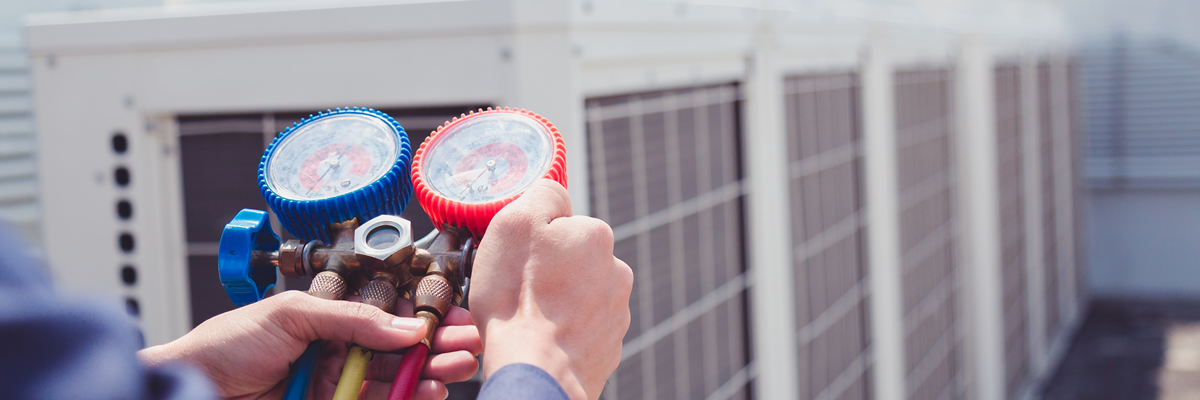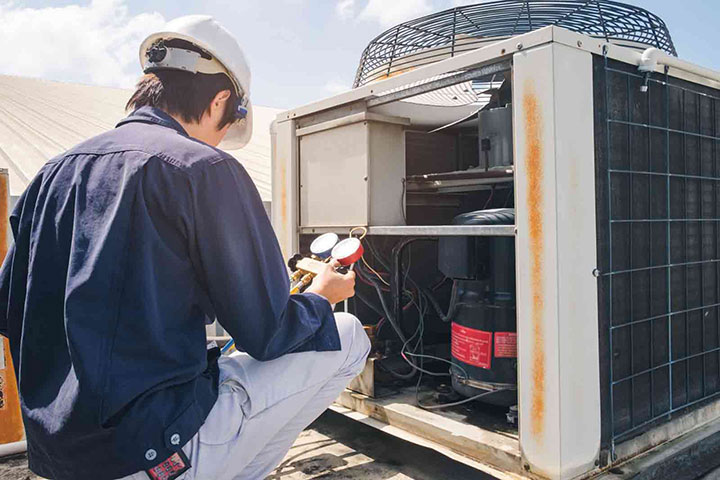Selecting Between a Heatpump and Heating System: Key Considerations for Your Cooling And Heating Demands
When examining heating choices for a/c requires, the choice between a heatpump and a furnace can be complex. Each system uses distinct advantages tailored to particular environments and energy effectiveness goals. Recognizing these distinctions is necessary for making an enlightened choice. Trick aspects such as installation expenses and environmental influence further make complex the option process. Which choice really aligns with one's comfort and sustainability preferences? The adhering to sections will certainly discover these factors to consider in information.
Comprehending Warmth Pumps: How They Function and Their Benefits
While numerous home owners think about numerous home heating alternatives, understanding how heatpump feature and their advantages can significantly influence their decision. Heatpump operate by transferring warm rather than generating it. In the wintertime, they extract heat from the outdoors air or ground and transfer it inside your home, while in the summer, they reverse this procedure, cooling the home by eliminating warmth outside. This dual functionality makes them versatile for year-round environment control.One of the primary advantages of heatpump is their energy effectiveness. They utilize considerably much less power contrasted to standard heating systems, potentially causing lower energy expenses (heat pump installation ooltewah tn). Furthermore, heat pumps have a smaller carbon footprint, making them an eco-friendly option. They additionally need less maintenance than conventional systems, adding to long-lasting price savings. Overall, recognizing the technicians and benefits of warm pumps can help homeowners make notified decisions concerning their heating and cooling demands
Discovering Furnaces: Types, Procedure, and Benefits
Heaters are available in different types, including gas, electrical, and oil versions, each with unique functional systems. Recognizing these distinctions is vital, as they impact efficiency and heating efficiency. In addition, furnaces supply many advantages, such as regular warm output and dependability in colder environments.
Kinds of Heating systems
Furnace can vary considerably in design and operation, with heating systems being a preferred option among house owners. There are a number of types of heating systems, each making use of various fuel resources and modern technologies. Gas heating systems are common, leveraging all-natural gas to generate heat successfully. Electric heating systems, on the other hand, make use of electric resistance to create heat, frequently favored for their uncomplicated installment. Oil heating systems, while much less common, are effective in locations with limited gas gain access to (ductless mini splits). Additionally, condensing heating systems take full advantage of energy performance by recycling and capturing exhaust gases. Each type operates via a system of heat exchangers and ductwork to distribute warm air throughout a home. Understanding the distinctions between these heating system types is necessary for informed cooling and heating choices
Advantages of Furnaces
For house owners looking for reputable heat during cool months, the benefits of furnaces are considerable. Heaters provide regular heating, making sure also temperature levels throughout the home. They are specifically effective in extreme chilly, frequently outmatching heatpump in freezing conditions. Various types, including gas, electric, and oil furnaces, provide versatility to satisfy diverse needs and preferences.Furnaces likewise often tend to have lower initial installation costs contrasted to heatpump, making them an extra accessible option for many. Their robust style adds to a longer life expectancy, with lots of systems lasting over 15 years with appropriate maintenance. Additionally, modern heaters are commonly equipped with innovative modern technology for improved effectiveness, which can bring about minimized energy expenses. In general, furnaces stay a trustworthy option for effective home heating.

Power Efficiency: Comparing Heat Pumps and Furnaces
When contrasting power efficiency between warm pumps and heaters, the Seasonal Energy Performance Proportion (SEER) plays a necessary function in determining performance. In addition, a functional expense evaluation reveals the long-term monetary ramifications of each system. Understanding these elements can assist property owners in making educated choices concerning their heating services.
Seasonal Energy Efficiency Ratio
Energy effectiveness plays an important function in the decision-making procedure in between warm pumps and heaters, especially when taking into consideration the Seasonal Power Effectiveness Proportion (SEER) This statistics actions the cooling efficiency of heatpump over an entire cooling season, offering a standardized way to assess performance. Higher SEER rankings show higher energy efficiency, equating to lower energy intake and lowered energy costs. On the other hand, heating systems are normally assessed utilizing the Annual Gas Usage Efficiency (AFUE) score, which reflects heating performance. When contrasting these 2 systems, property owners ought to prioritize SEER scores for heatpump, as they directly impact total power cost savings and environmental sustainability. A complete understanding of SEER can especially influence the long-term contentment and cost-effectiveness of the picked a/c service.
Operational Expense Analysis
Recognizing the operational prices connected with heat pumps and heaters is essential for house owners assessing their options. Warm pumps usually offer greater energy performance, converting electrical energy into warmth with very little waste. This results in reduced regular monthly energy bills, specifically in moderate environments. Alternatively, typical heaters, specifically gas models, may have reduced ahead of time costs but can incur higher operational expenditures in time as a result of fuel rates and effectiveness ratings.Moreover, heat pumps can operate as both heating and cooling down systems, potentially minimizing the demand for separate a/c devices. While first investments for warm pumps might be higher, their long-lasting financial savings in power efficiency can make them an extra economical selection for several houses. Careful analysis of regional power rates is vital to identify the most effective choice.
Installment Prices: What to Anticipate for Each Furnace
Installation prices More Bonuses for furnace can vary substantially in between heatpump and Source heaters, influencing home owners' decisions. Heat pumps usually have greater upfront setup prices, typically varying from $3,500 to $8,000, relying on the system size and complexity of setup. This consists of the outside system, interior handling system, and required ductwork adjustments. On the other hand, heating systems often tend to have lower initial costs, balancing in between $2,500 and $6,000, which can be appealing for budget-conscious home owners. Setup expenditures can enhance if substantial ductwork is required.Moreover, the choice of gas type for heaters-- all-natural gas, gas, or electric-- can additionally affect installation prices. While warmth pumps offer energy effectiveness, their first financial investment might discourage some buyers. Ultimately, assessing setup costs together with lasting financial savings and effectiveness will help home owners in making notified decisions regarding their heater.
Climate Factors To Consider: Which System Carries Out Better in Your Area
Just how do environment conditions influence the performance of heating unit? The efficiency of heat pumps and heaters can differ significantly depending upon the local environment. In modest environments, heatpump stand out by effectively moving heat from the outside air, making them an energy-saving choice. Their effectiveness diminishes in extremely cold temperatures, where they may battle to remove enough warmth. Alternatively, furnaces, specifically gas designs, give trustworthy and constant heat despite outdoor problems, making them preferable in cooler regions.In locations that experience milder winter seasons, heatpump can operate successfully year-round, supplying both home heating and air conditioning. In comparison, regions with extreme wintertimes usually gain from the robustness of heaters. Inevitably, understanding the regional environment is important when making a decision between a heat pump and a heating system, as it directly affects their functional efficiency and general performance.
Maintenance Demands: Long-Term Care for Warm Pumps vs. Furnaces
While both heatpump and heating systems require normal maintenance to ensure peak efficiency, their details requirements and care regimens differ significantly. Heaters commonly need less frequent focus, with yearly inspections sufficing to examine for gas leaks, tidy filters, and evaluate general functionality. Their less complex layout often permits uncomplicated repairs.In contrast, warmth pumps necessitate semiannual maintenance because of their dual function in heating and air conditioning. This includes cleansing coils, checking refrigerant levels, and making sure that both the indoor and outdoor systems work at their finest. Furthermore, warmth pump maintenance usually includes even more detailed elements, making professional maintenance essential.Neglecting upkeep can bring about reduced efficiency and boosted power prices for both systems. Ultimately, home owners need to take into consideration these long-term care needs when choosing in between a heat pump and a furnace, as proactive maintenance can expand the life expectancy and performance of either system significantly.
Environmental Impact: Picking a Sustainable Home Heating Choice
The environmental effect of heater important link is a vital assessment for property owners looking for lasting choices. Warmth pumps are normally a lot more energy-efficient than conventional furnaces, as they transfer warmth instead of generate it, considerably decreasing carbon emissions. By utilizing renewable resource sources, such as air-source or geothermal heatpump, home owners can even more reduce their environmental footprint.On the various other hand, natural gas heaters send out greenhouse gases and contribute to air pollution, though they typically supply greater heat result. Nonetheless, advancements in technology have caused the development of high-efficiency heating systems that lessen emissions.Ultimately, choosing a furnace involves considering effectiveness versus environmental influence. House owners are motivated to review local energy sources and motivations for renewable systems, making certain a choice that lines up with both individual comfort and environmental responsibility. The decision affects not just instant convenience yet likewise long-term sustainability and environmental wellness.
Often Asked Questions
For How Long Do Warm Pumps and Furnaces Normally Last?
The lifespan of heatpump normally varies from 15 to twenty years, while heaters can last between 15 to three decades. Regular upkeep substantially influences their durability and performance in giving home heating solutions.
Can I Utilize a Warmth Pump in Very Cold Climates?
Heatpump can operate in exceptionally cold environments, yet their efficiency decreases as temperature levels decrease. In such problems, supplemental heating resources might be required to preserve comfy interior temperature levels and assure peak efficiency.

What Is the Sound Degree of Warm Pumps Versus Furnaces?
The sound levels of warmth pumps and heating systems vary considerably. Generally, warmth pumps operate even more silently than conventional furnaces, making them better for those conscious appear, while heating systems may generate louder functional noises throughout heating cycles.
Are Warmth Pumps Suitable for Both Home Heating and Cooling?
Warmth pumps are undoubtedly suitable for both home heating and cooling (heat pump service). They operate by transferring warmth, supplying efficient temperature control year-round, making them a functional option for homeowners seeking an all-in-one HVAC option
What Size Home Heating System Do I Need for My Home?
Determining the proper dimension heating unit for a home calls for examining factors such as square video footage, insulation top quality, neighborhood climate, and the home's design. Consulting a specialist can guarantee an accurate evaluation and perfect convenience. Warm pumps usually provide greater energy efficiency, transforming electric power right into warmth with minimal waste. In moderate environments, heat pumps stand out by successfully moving heat from the outside air, making them an energy-saving choice. Alternatively, furnaces, specifically gas models, offer trusted and consistent heat regardless of outside problems, making them better in cooler regions.In areas that experience milder winters months, warmth pumps can run effectively year-round, giving both heating and cooling. Warm pumps are typically more energy-efficient than conventional heating systems, as they transfer heat rather than generate it, considerably decreasing carbon discharges. By making use of eco-friendly energy resources, such as geothermal or air-source heat pumps, home owners can better decrease their environmental footprint.On the various other hand, natural gas furnaces release greenhouse gases and add to air contamination, though they typically offer greater heat outcome.